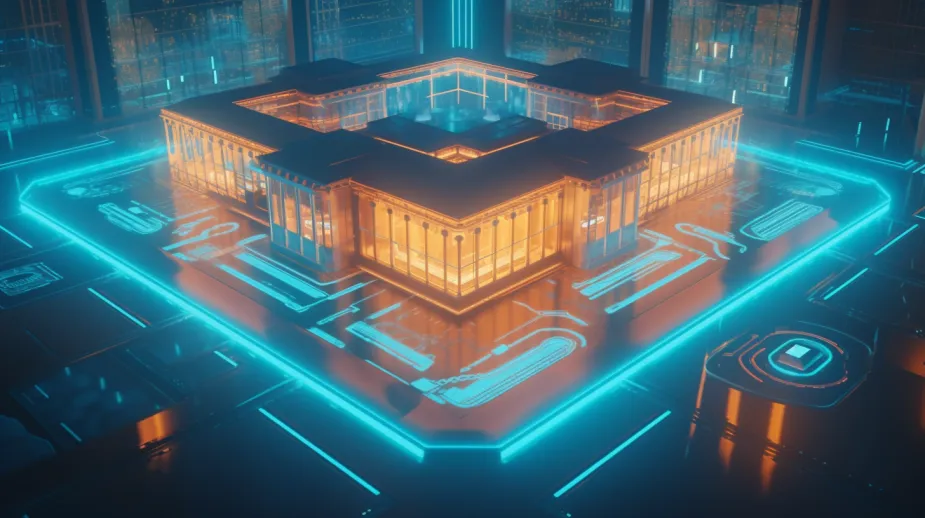Decentralized Autonomous Organizations (DAOs) present a groundbreaking approach to organizational structures, leveraging blockchain technology to operate autonomously with rules and decision-making processes encoded in smart contracts.
DAO use cases for government have the potential to transform traditional governmental operations by offering secure, transparent, and efficient methods of managing public services and resources.
In this discussion, we explore ten creative examples of DAO use cases for government, underlining both the advantages and the obstacles associated with this emerging technology.
By examining these examples, we gain insight into the practical applications of DAOs in governmental contexts, shedding light on the transformative power of these innovative organizations.
DAO Use Cases in Government
As DAO use cases for government continue to evolve and gain traction, it is crucial to understand the potential impact of this technology on various aspects of public administration.
Example 1: Budget Allocation
Utilizing DAOs to allocate public funds presents a transparent and efficient method that involves citizens in proposing and voting on budget priorities. This innovative approach not only fosters increased citizen engagement but also promotes trust in the budgeting process.
By involving the public in decision-making, governments can create more balanced and well-supported fiscal policies that better serve the needs of their constituents.
Example 2: Voting Systems
The implementation of DAOs in voting systems paves the way for secure and transparent electoral processes. With each vote recorded on the blockchain, the risk of tampering or manipulation is significantly reduced, ensuring the integrity of the voting process.
As a result, voter participation can increase, and electoral fraud can be effectively deterred, bolstering the foundations of democracy.
Example 3: Public Services Management
Incorporating DAOs into public services management, such as transportation or waste management, has the potential to transform service delivery.
By allowing citizens to propose and vote on service providers, governments can directly involve the public in decision-making, leading to improved service quality and reduced costs.
This participatory approach to public services management can result in more efficient and effective operations, ultimately benefiting both the government and citizens.
Example 4: Land Registry
The development of a decentralized land registry, supported by DAOs, can revolutionize the way property ownership and transactions are recorded and managed.
By using blockchain technology, this system increases transparency and prevents corruption, ensuring that land ownership and management are equitable and trustworthy.
Adopting a DAO-based land registry can significantly improve the security and fairness of property transactions, fostering a more just and transparent system for all.
Example 5: Identity Verification
One compelling use case for DAOs in government is the creation of a secure, decentralized identity verification system. By empowering citizens to control and manage their identity data, DAOs can help minimize identity theft and enhance privacy.
This decentralized approach offers increased security compared to traditional, centralized systems, which are often vulnerable to hacking or data breaches.y.
Example 6: Tax Collection
DAOs can also be employed to create transparent and efficient tax collection systems. By enabling citizens to propose and vote on tax policies and collection methods, governments can increase compliance and reduce tax evasion.
This democratic approach to tax policy can foster a sense of fairness and trust among citizens, leading to higher levels of civic engagement.
Example 7: Procurement and Contract Management
DAOs can revolutionize procurement and contract management processes by allowing citizens to propose and vote on suppliers and contract terms.
This increased involvement can lead to efficiency gains and reduced corruption, as the procurement process becomes more transparent and subject to public scrutiny. DAOs can also streamline contract management, reducing the need for costly intermediaries and bureaucratic red tape.
Example 8: Emergency Response
In times of crisis, DAOs can coordinate emergency response efforts by enabling citizens to propose and vote on emergency response plans and resource allocation.
This collaborative approach can improve response times and reduce costs by ensuring that resources are allocated according to the needs and priorities of the affected communities.
DAOs can also facilitate real-time communication and coordination among different stakeholders, such as government agencies, NGOs, and local communities.
Example 9: Social Welfare Distribution
DAOs can be utilized to manage social welfare programs, allowing citizens to propose and vote on eligibility criteria and benefit levels.
This increased engagement can enhance efficiency and reduce instances of fraud, as the public can actively participate in the decision-making process and monitor the distribution of funds.
DAOs can also help ensure that social welfare programs are responsive to the needs of the community, leading to more equitable outcomes.
Example 10: Transparency and Accountability
Implementing DAOs in government operations can significantly increase transparency and accountability. By allowing citizens to monitor and verify government actions and expenditures, DAOs provide an additional layer of oversight that can lead to more responsible and equitable governance.
This increased transparency can also help build trust between citizens and their government, fostering a sense of civic responsibility and pride.

Benefits and Challenges of DAOs for Government
The integration of Decentralized Autonomous Organizations (DAOs) into government operations promises numerous benefits, ranging from increased efficiency to greater transparency. However, as with any emerging technology, it also presents challenges and risks that need to be addressed. In this article, we will delve deeper into the advantages and potential drawbacks of implementing DAOs in the public sector.
Benefits of DAOs for Government
- Enhanced Efficiency and Cost-effectiveness:
One of the primary benefits of DAOs is their ability to streamline processes and reduce costs associated with traditional bureaucratic systems. By automating various tasks and decision-making processes, DAOs can save time and resources, making government operations more efficient and cost-effective.
- Increased Transparency and Accountability:
Transparency is a critical component of good governance, and DAOs can significantly enhance this aspect. By utilizing blockchain technology to record and store data, DAOs can create an immutable and transparent record of government actions, financial transactions, and policy decisions. This increased transparency can help promote accountability and deter corruption.
- Greater Citizen Engagement and Participation:
DAOs can empower citizens by allowing them to propose, vote on, and directly influence government decisions. This increased involvement fosters a sense of ownership and engagement among citizens, potentially leading to greater satisfaction with public services and higher levels of trust in the government.
- Improved Data Management and Security:
Data management and security are crucial in today’s digital age, and DAOs can offer significant improvements in these areas. By utilizing decentralized and encrypted storage systems, DAOs can provide a secure environment for sensitive data and reduce the risk of data breaches or manipulation.
Challenges and Risks of DAOs for Government
Despite the numerous benefits, the implementation of DAOs in government operations also comes with challenges and risks that must be addressed.
- Legal and Regulatory Hurdles:
As a relatively new and rapidly evolving technology, DAOs often lack clear legal and regulatory frameworks. This can create uncertainty for governments when attempting to integrate DAOs into their operations. To overcome this challenge, governments must work on establishing legal and regulatory guidelines that accommodate the unique nature of DAOs while still ensuring compliance with existing laws.
- Technical Expertise and Infrastructure Requirements:
The successful implementation of DAOs in government requires significant technical expertise and robust infrastructure. Governments may need to invest in training their workforce and acquiring the necessary technology to support DAO operations. Additionally, they may need to collaborate with private sector partners to access specialized knowledge and resources.
- Potential for Corruption and Manipulation:
While DAOs can offer increased transparency and accountability, they are not immune to corruption and manipulation. Bad actors may attempt to exploit vulnerabilities in the system or manipulate votes to achieve their objectives. To minimize these risks, governments must remain vigilant and ensure the security and integrity of their DAO systems.
Moving Forward: Steps for Governments
For governments considering the adoption of DAOs, several steps can be taken to ensure successful integration:
- Research and Education: Governments should invest in research and education to better understand the technology and its potential applications in the public sector. This may include partnering with academic institutions, attending conferences, or collaborating with blockchain experts.
- Regulatory Frameworks: To facilitate the adoption of DAOs, governments should develop clear regulatory frameworks that address potential legal and compliance issues. This will provide a stable environment for the growth and development of DAOs in the public sector.
- Pilot Programs: Governments can initiate pilot programs to test the feasibility and effectiveness of DAOs in specific areas of public service. This will enable them to identify best practices, address challenges, and refine their approach before broader implementation.
- Public-Private Partnerships: Collaborating with private sector organizations can provide governments with access to technical expertise, resources, and infrastructure necessary for the successful implementation of DAOs. These partnerships can also foster innovation and create new opportunities for growth.
- Stakeholder Engagement: Engaging citizens and other stakeholders in the development and implementation of DAOs is crucial to ensure widespread acceptance and participation. By involving citizens in decision-making processes, governments can build trust and promote greater transparency and accountability.
- Ongoing Evaluation and Improvement: Governments should continuously assess and improve their DAO initiatives, learning from their successes and failures. This will enable them to adapt and refine their approach as the technology evolves and new challenges emerge.






